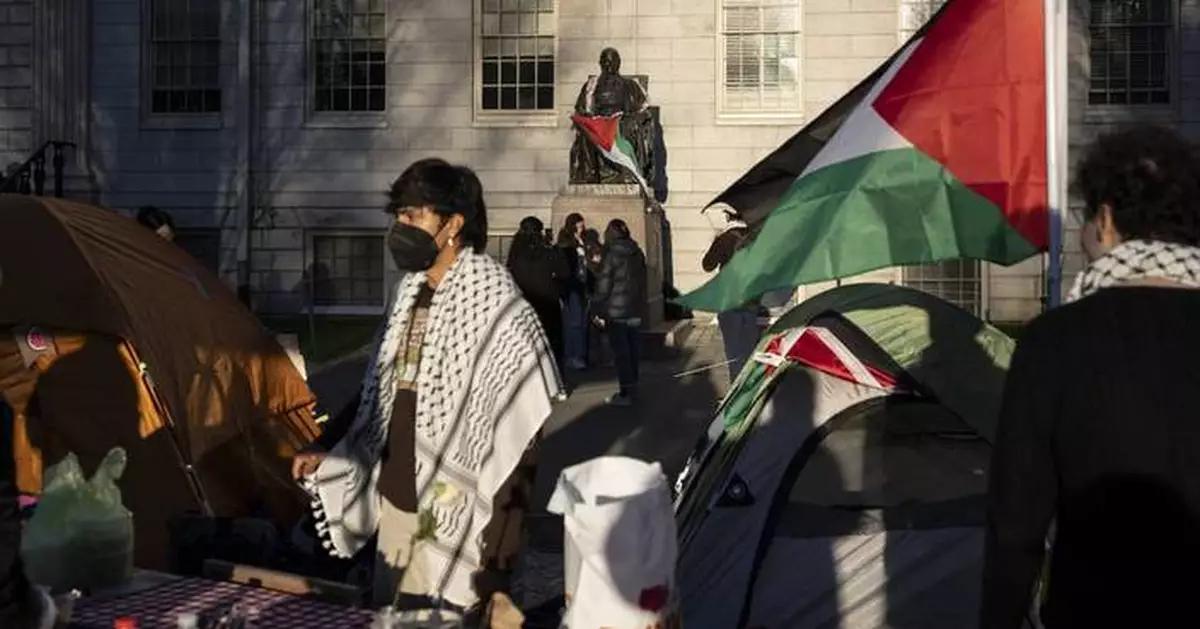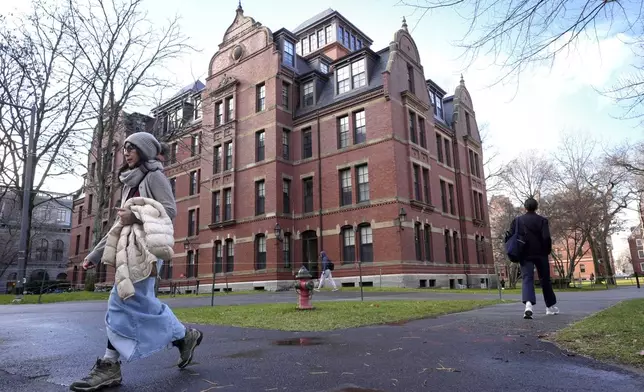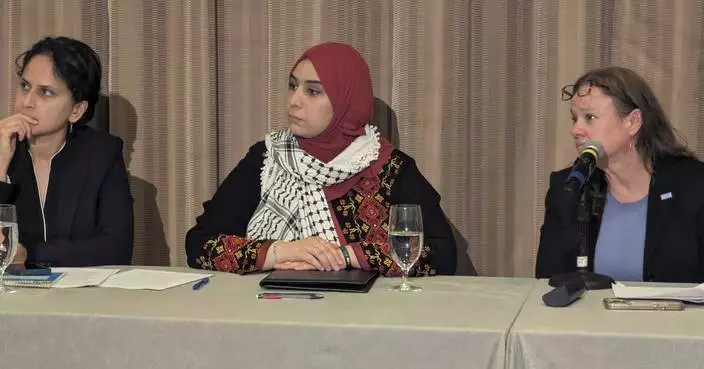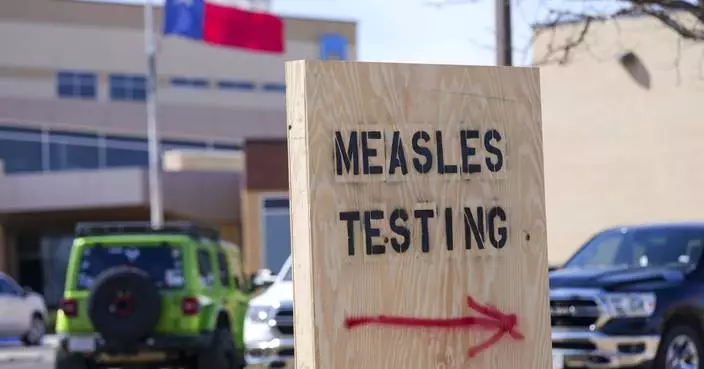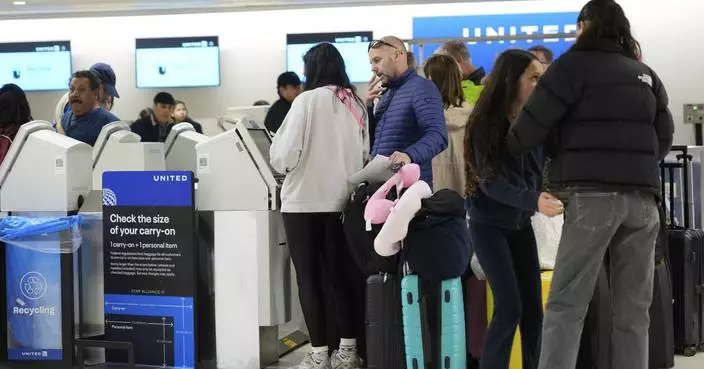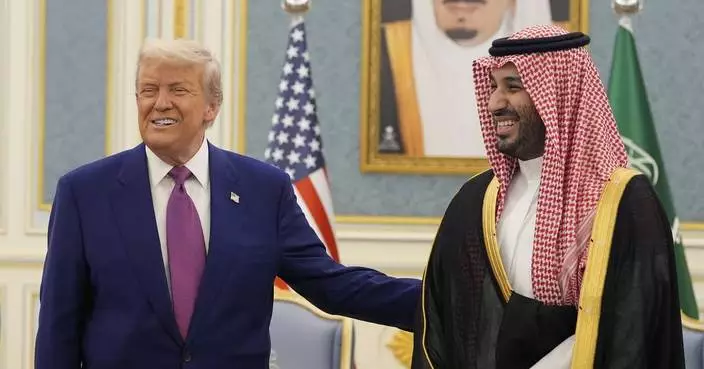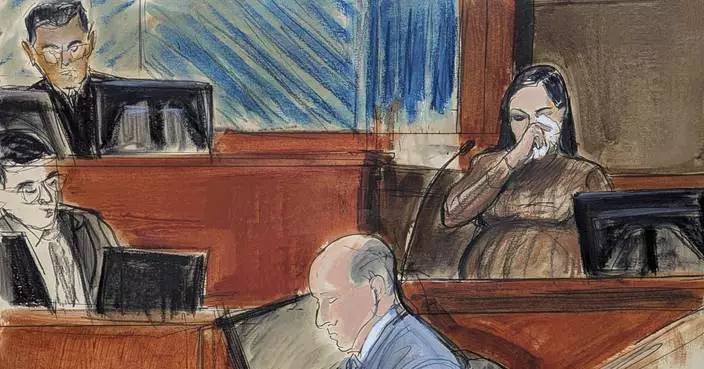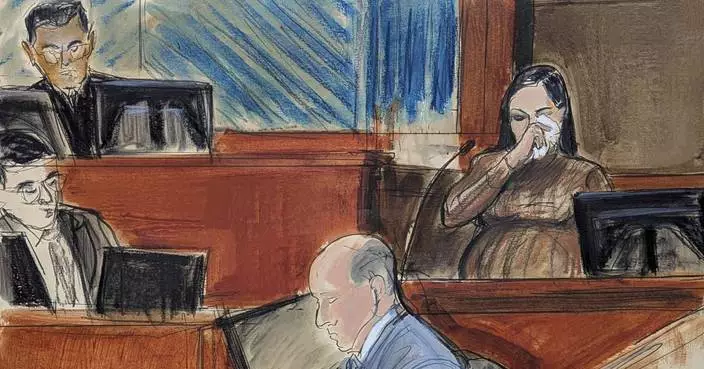On one side is Harvard, the nation’s oldest and wealthiest university, with a brand so powerful that its name is synonymous with prestige. On the other side is the Trump administration, determined to go further than any other White House to reshape American higher education.
Both sides are digging in for a clash that could test the limits of the government’s power and the independence that has made U.S. universities a destination for scholars around the world.
Click to Gallery
The Harvard University logo is displayed on a building at the school, Tuesday, April 15, 2025, in Cambridge, Mass. (AP Photo/Charles Krupa)
Spring buds appear on a tree near Eliot House, rear, at Harvard University, Tuesday, April 15, 2025, in Cambridge, Mass. (AP Photo/Charles Krupa)
A runner passes daffodils and dormitories at Harvard University, Tuesday, April 15, 2025, in Cambridge, Mass. (AP Photo/Charles Krupa)
A sculler rows down the Charles River near Harvard University, at rear, Tuesday, April 15, 2025, in Cambridge, Mass. (AP Photo/Charles Krupa)
Visitors stop at the statue of John Harvard in Harvard Yard at Harvard University, Tuesday, April 15, 2025, in Cambridge, Mass. (AP Photo/Charles Krupa)
FILE - People walk between buildings, Dec. 17, 2024, on the campus of Harvard University in Cambridge, Mass. (AP Photo/Steven Senne, File)
FILE - Rowers paddle down the Charles River near the campus of Harvard University in Cambridge, Mass., March 7, 2017. (AP Photo/Charles Krupa, File)
FILE - Students protesting against the war in Gaza, and passersby walking through Harvard Yard, are seen at an encampment at Harvard University in Cambridge, Mass., on April 25, 2024. (AP Photo/Ben Curtis, File)
FILE - A student protester stands in front of the statue of John Harvard, the first major benefactor of Harvard College, draped in the Palestinian flag, at an encampment of students protesting against the war in Gaza, at Harvard University in Cambridge, Mass., April 25, 2024. (AP Photo/Ben Curtis, File)
On Monday, Harvard became the first university to openly defy the Trump administration as it demands sweeping changes to limit activism on campus. The university frames the government’s demands as a threat not only to the Ivy League school but to the autonomy that the Supreme Court has long granted American universities.
“The university will not surrender its independence or relinquish its constitutional rights,” the university’s lawyers wrote Monday to the government. “Neither Harvard nor any other private university can allow itself to be taken over by the federal government.”
The federal government says it’s freezing more than $2.2 billion in grants and $60 million in contracts to Harvard. The hold on funding marks the seventh time the Trump administration has taken such a step at one of the nation’s most elite colleges, in an attempt to force compliance with Trump’s political agenda. Six of the seven schools are in the Ivy League.
No university is better positioned to put up a fight than Harvard, whose $53 billion endowment is the largest in the nation. But like other major universities, Harvard also depends on the federal funding that fuels its scientific and medical research. It’s unclear how long Harvard could continue without the frozen money.
Already, Harvard’s refusal appears to be emboldening other institutions.
After initially agreeing to several demands from the Trump administration, Columbia University’s acting president took a more defiant tone in a campus message Monday, saying some of the demands “are not subject to negotiation.”
In her statement, Claire Shipman said she read of Harvard’s rejection with “great interest.” Columbia was previously seen as a prime candidate to challenge the administration's demands and faced blowback from faculty and free speech groups when it agreed to make concessions instead.
“Harvard is obviously a particularly powerful institution. And its decision has potential to galvanize other universities into some kind of collective pushback,” said David Pozen, a Columbia law professor who argued that the government’s demands are unlawful.
Trump threatened Tuesday to escalate the dispute, suggesting on social media that Harvard should lose its tax-exempt status “if it keeps pushing political, ideological, and terrorist inspired/supporting ‘Sickness?’”
The impasse raises questions about how far the administration is willing to go. However it plays out, a legal battle is likely. A faculty group has already brought a court challenge against the demands, and many in academia expect Harvard to bring its own lawsuit.
In its refusal letter, Harvard said the government’s demands violate the school’s First Amendment rights and other civil rights laws.
For the Trump administration, Harvard presents the first major hurdle in its attempt to force change at universities that Republicans say have become hotbeds of liberalism and antisemitism.
The conflict is straining the longstanding relationship between the federal government and universities that use federal money to fuel scientific breakthroughs. Long seen as a benefit to the greater good, that money has become an easy source of leverage for the Trump administration.
Federal money is an investment and not an entitlement, federal officials wrote in a letter to Harvard last week, accusing the school of failing to meet civil rights obligations that are a condition for federal aid. They argued that Harvard has allowed political ideology to stifle intellectual creativity.
Trump's campaign has targeted schools accused of tolerating antisemitism amid a wave of pro-Palestinian protests on U.S. campuses. Some of the government's demands touch directly on that activism, calling on Harvard to impose tougher discipline on protesters and to screen international students for those who are “hostile to the American values.”
Other demands order Harvard to cease all diversity, equity and inclusion programs and to end admissions or hiring practices that consider “race, color, national origin, or proxies thereof.”
Many of the same White House officials who are relishing the political attacks on the elite institutions are products of such schools themselves. Trump is a graduate of the University of Pennsylvania, while Vice President JD Vance has a degree from Yale Law School.
At least two Cabinet members — Defense Secretary Pete Hegseth and Health and Human Services Secretary Robert F. Kennedy — earned degrees from Harvard. Hegseth scribbled “return to sender” on his Harvard diploma on live television as part of his crusade against so-called leftist causes at colleges and universities.
Harvard President Alan Garber said the demands go beyond the government's authority. In a campus message, he wrote that “no government — regardless of which party is in power — should dictate what private universities can teach, whom they can admit and hire, and which areas of study and inquiry they can pursue.”
Some conservatives have suggested that if Harvard wants independence, it should follow the example of colleges that forgo federal funding to be free of government influence. Hillsdale College, a small conservative school in Michigan that's among the most prominent examples, quipped on social media that Harvard could become the “Hillsdale of the East.”
“Not taking taxpayer money should be Harvard’s next step,” the school said.
That's an unlikely scenario, but Harvard may have to find other ways to weather the government's funding cuts. Harvard generally steers about 5% of its endowment value toward university operations every year, accounting for about a third of its total budget, according to university documents.
The university could draw more from its endowment, but colleges generally try to avoid spending more than 5% to protect investment gains. Like other schools, Harvard is limited in how it spends endowment money, much of which comes from donors who specify how they want it to be used.
The government hasn't publicly said which grants and contracts are being frozen, but if the university has to survive with little federal funding for an extended period, it would likely require cuts.
“All universities need to be planning for this situation and thinking about how they can survive in a leaner form through the coming years, if it comes to that,” Pozen said.
Among those applauding Harvard's decision was former President Barack Obama, who called it a rejection of the government's “ham-handed attempt to stifle academic freedom.”
“Let’s hope other institutions follow suit,” he said on social media.
A statement from Harvard's Republican Club implored the university to reach a resolution with the government and “return to the American principles that formed the great men of this nation.”
Associated Press Writer Seung Min Kim contributed to this report.
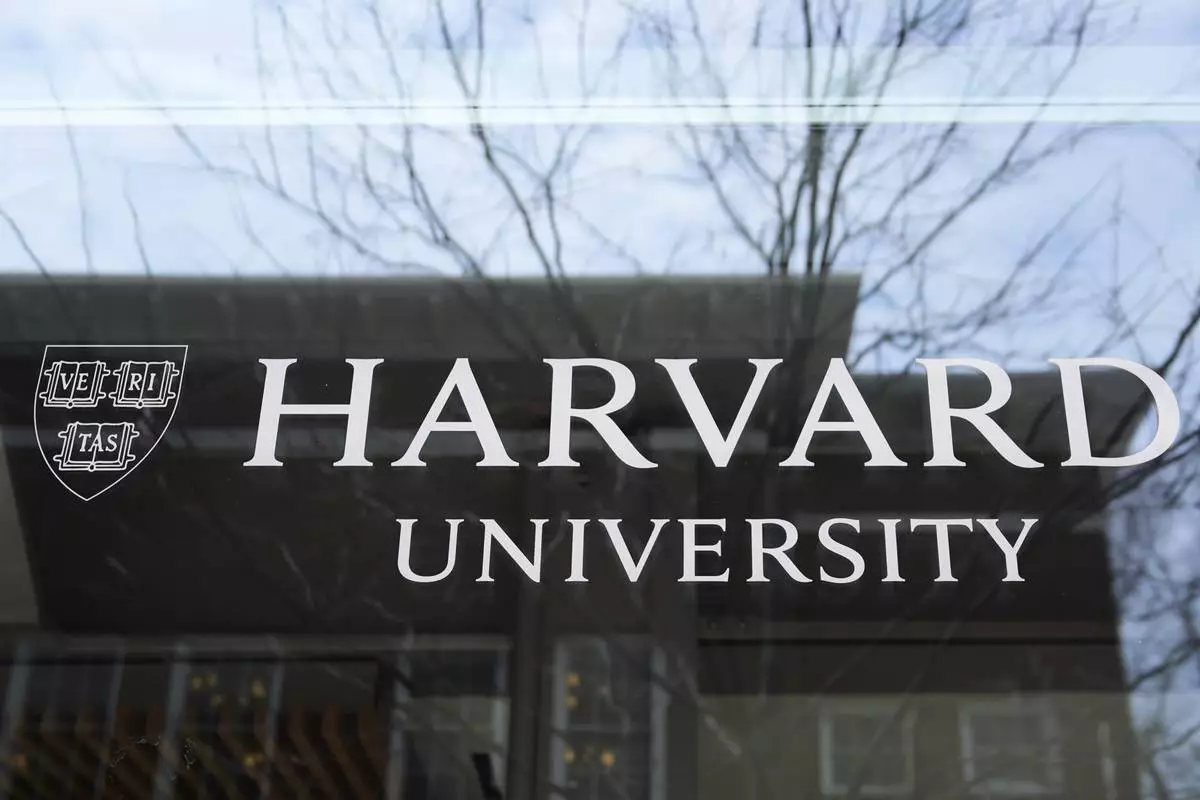
The Harvard University logo is displayed on a building at the school, Tuesday, April 15, 2025, in Cambridge, Mass. (AP Photo/Charles Krupa)
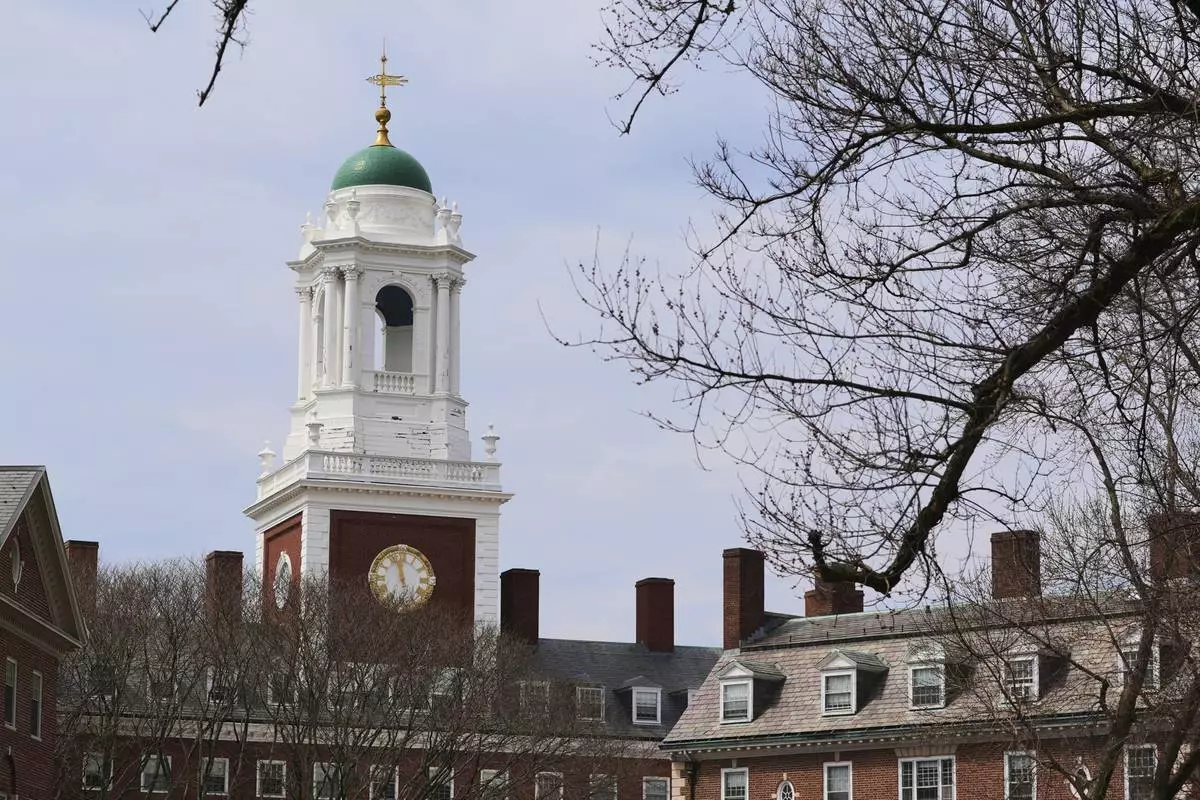
Spring buds appear on a tree near Eliot House, rear, at Harvard University, Tuesday, April 15, 2025, in Cambridge, Mass. (AP Photo/Charles Krupa)
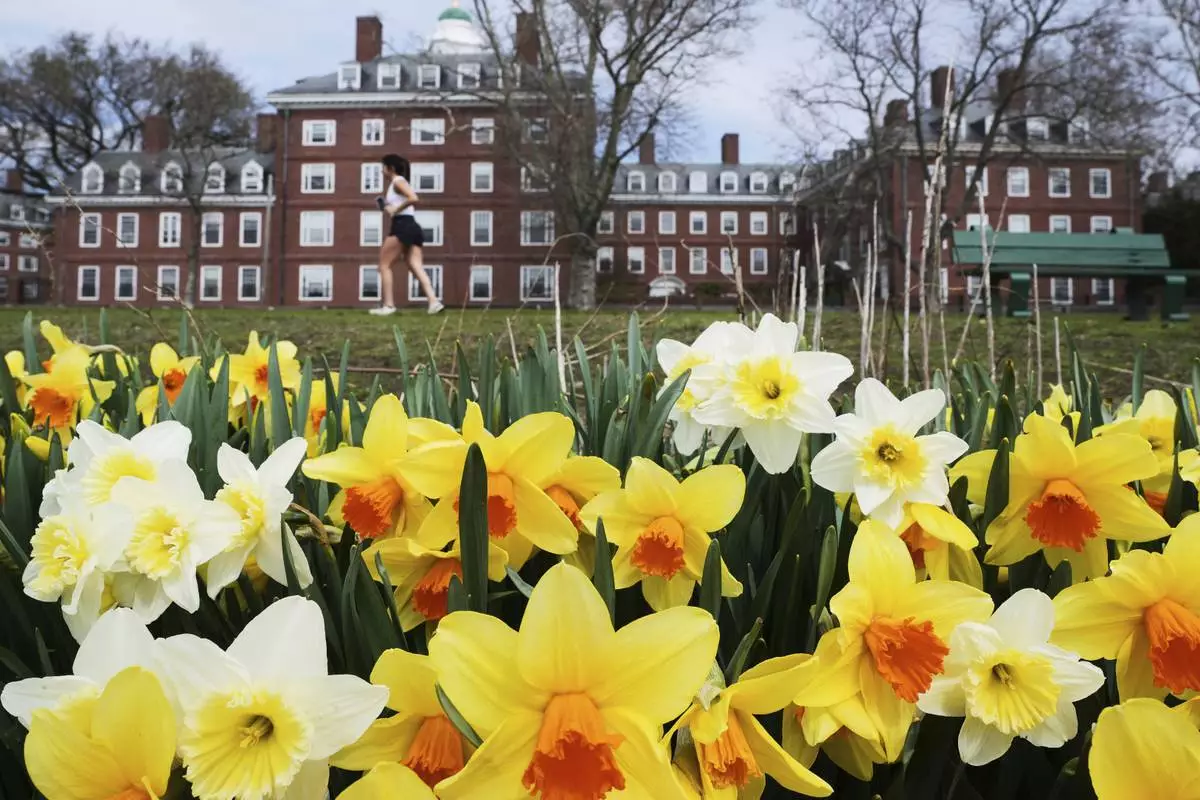
A runner passes daffodils and dormitories at Harvard University, Tuesday, April 15, 2025, in Cambridge, Mass. (AP Photo/Charles Krupa)
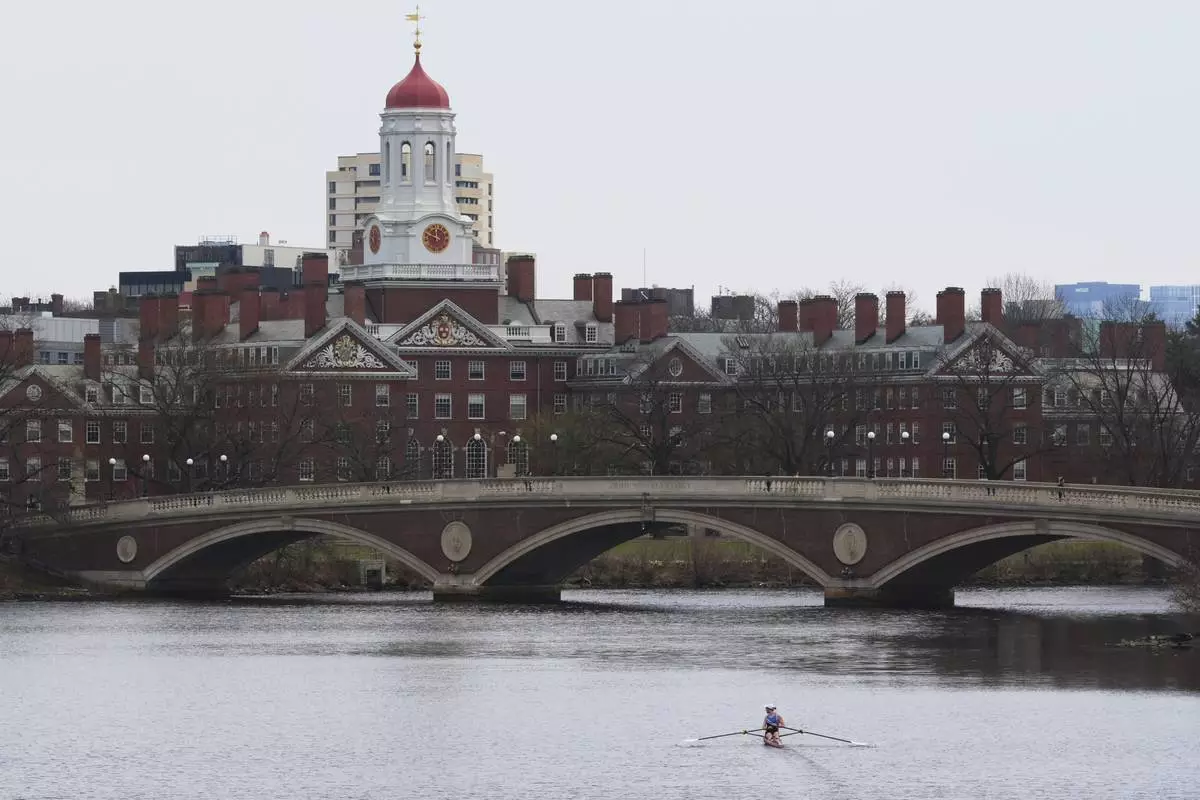
A sculler rows down the Charles River near Harvard University, at rear, Tuesday, April 15, 2025, in Cambridge, Mass. (AP Photo/Charles Krupa)
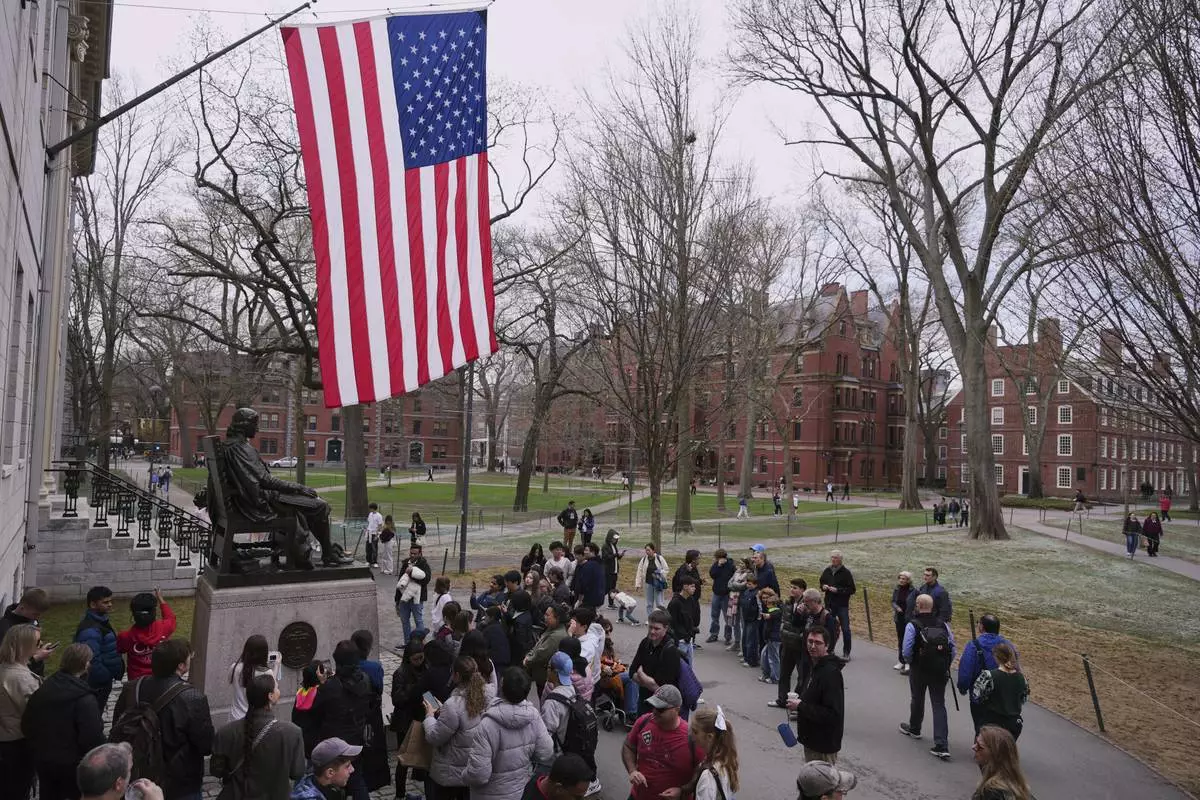
Visitors stop at the statue of John Harvard in Harvard Yard at Harvard University, Tuesday, April 15, 2025, in Cambridge, Mass. (AP Photo/Charles Krupa)

FILE - People walk between buildings, Dec. 17, 2024, on the campus of Harvard University in Cambridge, Mass. (AP Photo/Steven Senne, File)
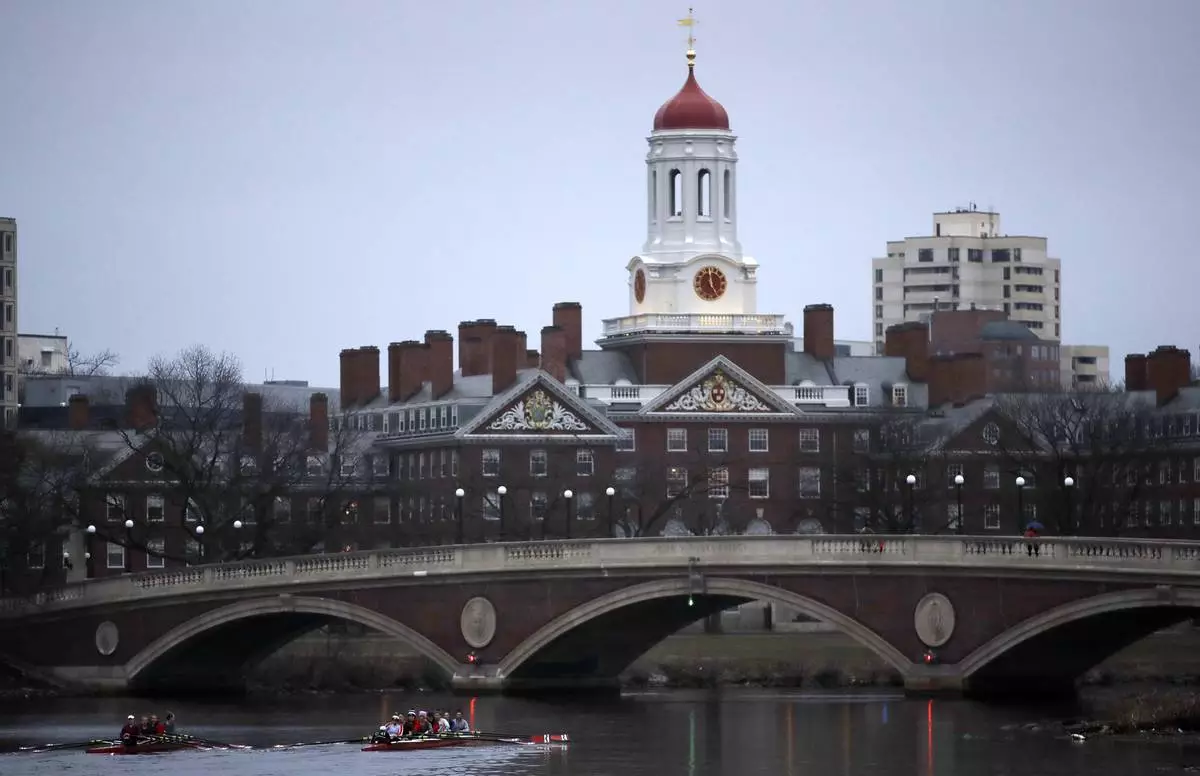
FILE - Rowers paddle down the Charles River near the campus of Harvard University in Cambridge, Mass., March 7, 2017. (AP Photo/Charles Krupa, File)
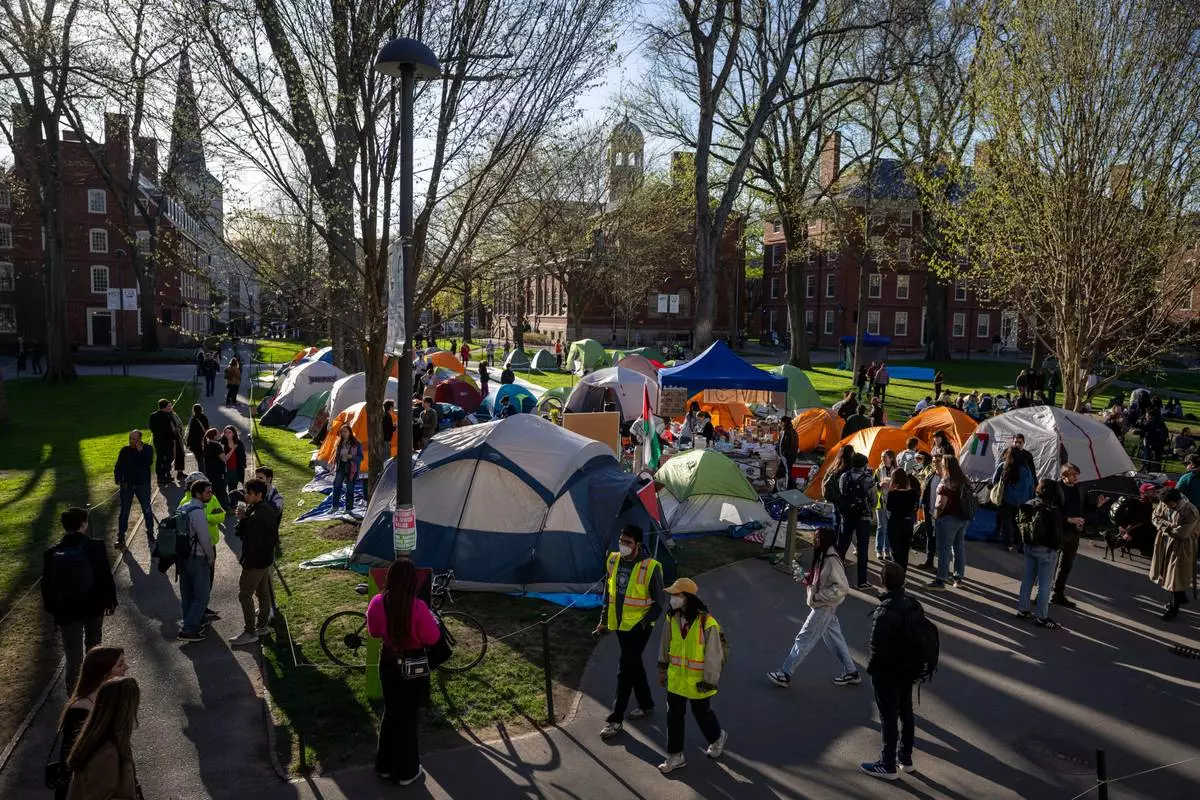
FILE - Students protesting against the war in Gaza, and passersby walking through Harvard Yard, are seen at an encampment at Harvard University in Cambridge, Mass., on April 25, 2024. (AP Photo/Ben Curtis, File)
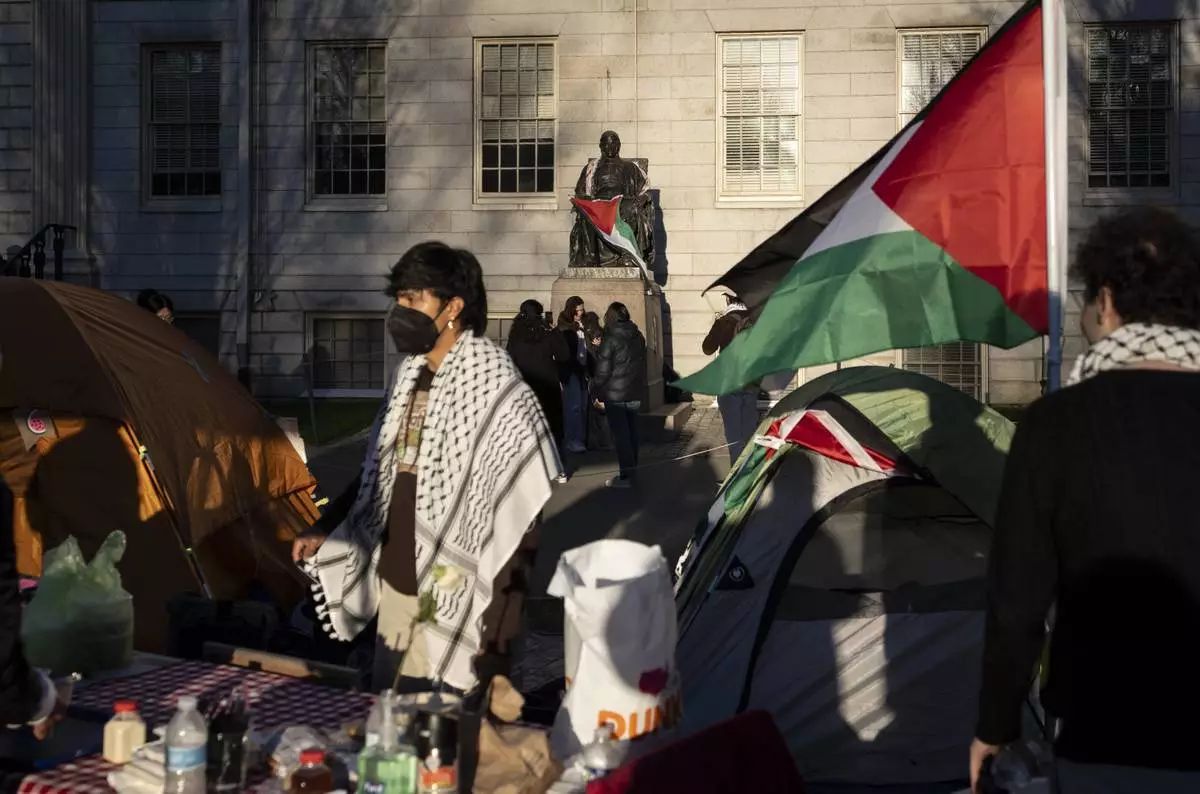
FILE - A student protester stands in front of the statue of John Harvard, the first major benefactor of Harvard College, draped in the Palestinian flag, at an encampment of students protesting against the war in Gaza, at Harvard University in Cambridge, Mass., April 25, 2024. (AP Photo/Ben Curtis, File)
RIYADH, Saudi Arabia (AP) — U.S. President Donald Trump met with interim Syrian President Ahmad al-Sharaa in Saudi Arabia on Wednesday, the first encounter between the two nations’ leaders in 25 years and one that could serve as a turning point for Syria as it struggles to emerge from decades of international isolation.
The meeting, on the sidelines of Trump's get-together with the leaders of the Gulf Cooperation Council, marks a major turn of events for a Syria still adjusting to life after the over 50-year, iron-gripped rule of the Assad family, and for its new leader, who once had a $10 million U.S. bounty for his arrest.
Trump praised al-Sharaa to reporters after the meeting, saying he was a “young, attractive guy. Tough guy. Strong past. Very strong past. Fighter.”
Under the nom de guerre Abu Mohammed al-Golani, al-Sharaa had ties to al-Qaida and joined insurgents battling U.S. forces in Iraq before entering the Syrian war. He was even imprisoned by U.S. troops there for several years.
“He’s got a real shot at holding it together," Trump said. "He’s a real leader. He led a charge, and he’s pretty amazing.”
Trump had announced the day before as he kicked off his three-nation Middle East tour in Riyadh that he would also move to lift U.S. sanctions imposed on Syria under the deposed autocrat Bashar Assad.
People across Syria cheered in the streets and set off fireworks on Tuesday night to celebrate, hopeful their nation — locked out of credit cards and global finance — might rejoin the world's economy when they need investments the most.
The meeting came even after Israeli Prime Minister Benjamin Netanyahu had earlier asked Trump not to lift sanctions on Syria, again underscoring a growing discontent between the White House and the Israeli government as its war on Hamas in the Gaza Strip rages on.
Trump told the Gulf Cooperation Council after his meeting with al-Sharaa that he was ending sanctions on Syria in order to give the country “a fresh start.”
“It gives them a chance for greatness. The sanctions were really crippling, very powerful," Trump said.
Trump said al-Sharaa had agreed to join the Abraham Accords and eventually recognize Israel, but Syria hasn't confirmed that. Trump told reporters, “I think they have to get themselves straightened up. I told him, ‘I hope you’re going to join when it’s straightened out.’ He said, ‘Yes.’ But they have a lot of work to do.”
Trump said on Tuesday that he would meet al-Sharaa, who flew in to the Saudi capital for the face-to-face.
Even before its ruinous civil war that began in 2011, Syria struggled under a tightly controlled socialist economy and under sanctions by the U.S. as a state sponsor of terror since 1979.
Al-Sharaa is the first Syrian leader to meet an American president since Hafez Assad met Bill Clinton in Geneva in 2000. The Trump-al-Sharaa meeting took place behind closed doors, and the White House later said it ran for just over 30 minutes.
Turkish President Recep Tayyip Erdogan joined the meeting with Trump, Saudi Crown Prince Mohammed bin Salman and al-Sharaa via phone. Turkey was a main backer to al-Sharaa and his rebel faction.
“I felt very strongly that this would give them a chance,” Trump said of Syria. “It’s not going to be easy anyway, so gives them a good strong chance. And it was my honor to do so.”
White House press secretary Karoline Leavitt said in a statement that Trump urged al-Sharaa to diplomatically recognize Israel, “tell all foreign terrorists to leave Syria” and help the U.S. stop any resurgence of the Islamic State group.
Trump, a Republican, also asked for the Syrian government to “assume responsibility” for over a dozen detention centers holding some 9,000 suspected members of the Islamic State group, Leavitt added. The prisons are run by the U.S.-backed and Kurdish-led forces that spearheaded the military campaign against the extremists and controlled the last sliver of land they once held in March 2019.
As part of a deal reached in March between the Syrian government and the Kurdish-led forces, all border crossings with Iraq and Turkey, airports and oil fields in the Northeast would be brought under the central government’s control by the end of the year.
Trump's desire for Syria to take over the prisons also signals the potential of a full American military withdrawal from Syria.
Syria’s Foreign Ministry said Trump and al-Sharaa discussed the Syrian-U.S. partnership in fighting terror and armed groups such as IS standing in the way of stability.
Al-Sharaa was named interim president of Syria in January, a month after a stunning offensive by insurgent groups led by al-Sharaa’s Hayat Tahrir al-Sham, or HTS, that stormed Damascus, ending the 54-year rule of the Assad family.
Many Gulf Arab leaders have rallied behind the new government in Damascus and want Trump to follow, believing it is a bulwark against Iran’s return to influence in Syria, where it had helped prop up Assad’s government during a decadelong civil war.
But longtime U.S. ally Israel has been deeply skeptical of al-Sharaa’s extremist past and cautioned against swift recognition of the new government. The request came during Netanyahu’s visit to Washington last month, according to an Israeli official who spoke on the condition of anonymity to discuss the subject.
Israel was concerned a cross-border attack similar to Hamas’ Oct. 7, 2023, assault could come from Syria. Israel also fears al-Sharaa and his Islamist past could pose a threat on its northern border.
Syrians cheered the announcement by Trump that the U.S. will move to lift sanctions on the beleaguered Middle Eastern nation.
The state-run SANA news agency published video and photographs of Syrians cheering in Umayyad Square, the largest in the country’s capital, Damascus. Others honked their car horns or waved the new Syrian flag in celebration.
People whistled and cheered as fireworks lit the night sky.
A statement from Syria’s Foreign Ministry called the announcement “a pivotal turning point for the Syrian people as we seek to emerge from a long and painful chapter of war.”
“The removal of these sanctions offers a vital opportunity for Syria to pursue stability, self-sufficiency and meaningful national reconstruction, led by and for the Syrian people,” the statement added.
Madhani reported from Dubai, United Arab Emirates. Associated Press photographer Alex Brandon and writers Suzan Fraser in Ankara, Turkey; Tia Goldenberg in Tel Aviv, Israel, and Bassem Mroue in Beirut contributed to this report.
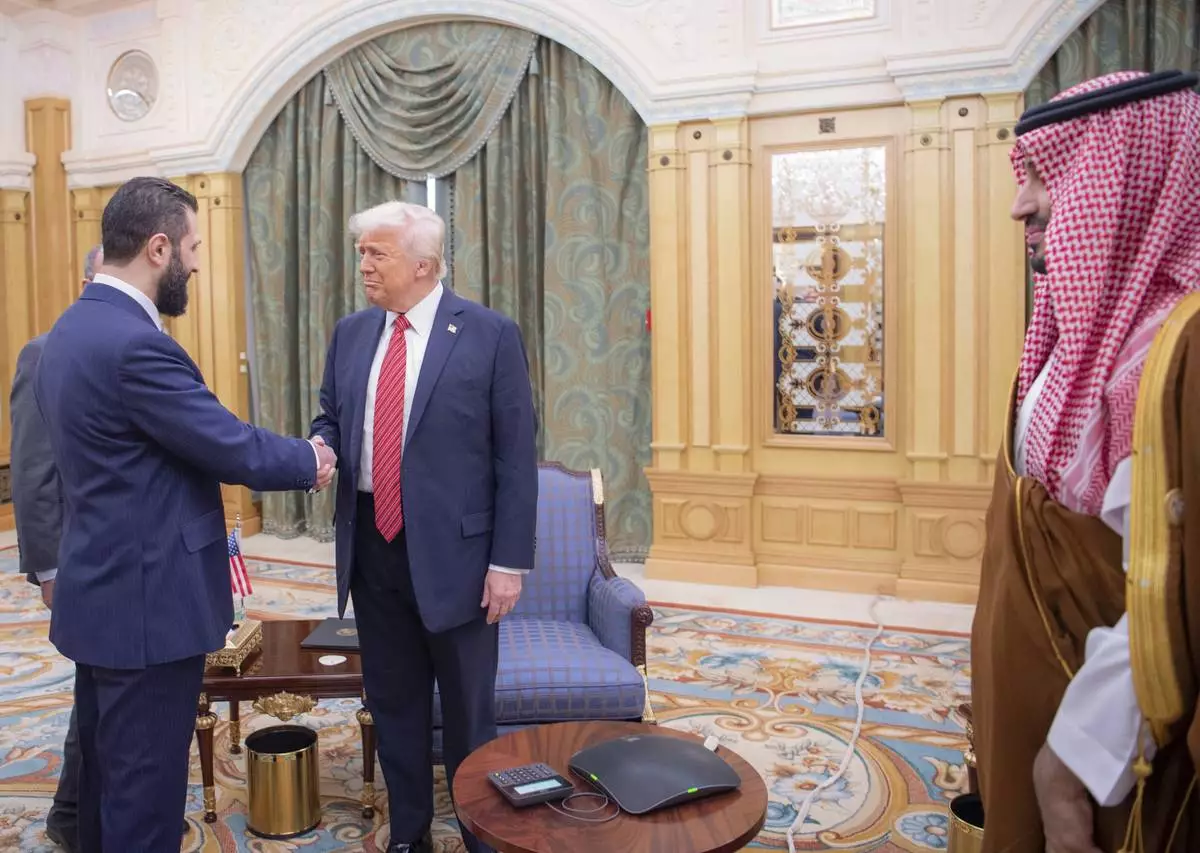
In this photo released by the Saudi Royal Palace, Syria's interim President Ahmad al-Sharaa, left, shakes hands with President Donald Trump, centre, in Riyadh, Saudi Arabia, Wednesday, May 14, 2025. At right is Saudi Crown Prince Mohammed bin Salman.(Bandar Aljaloud/Saudi Royal Palace via AP)
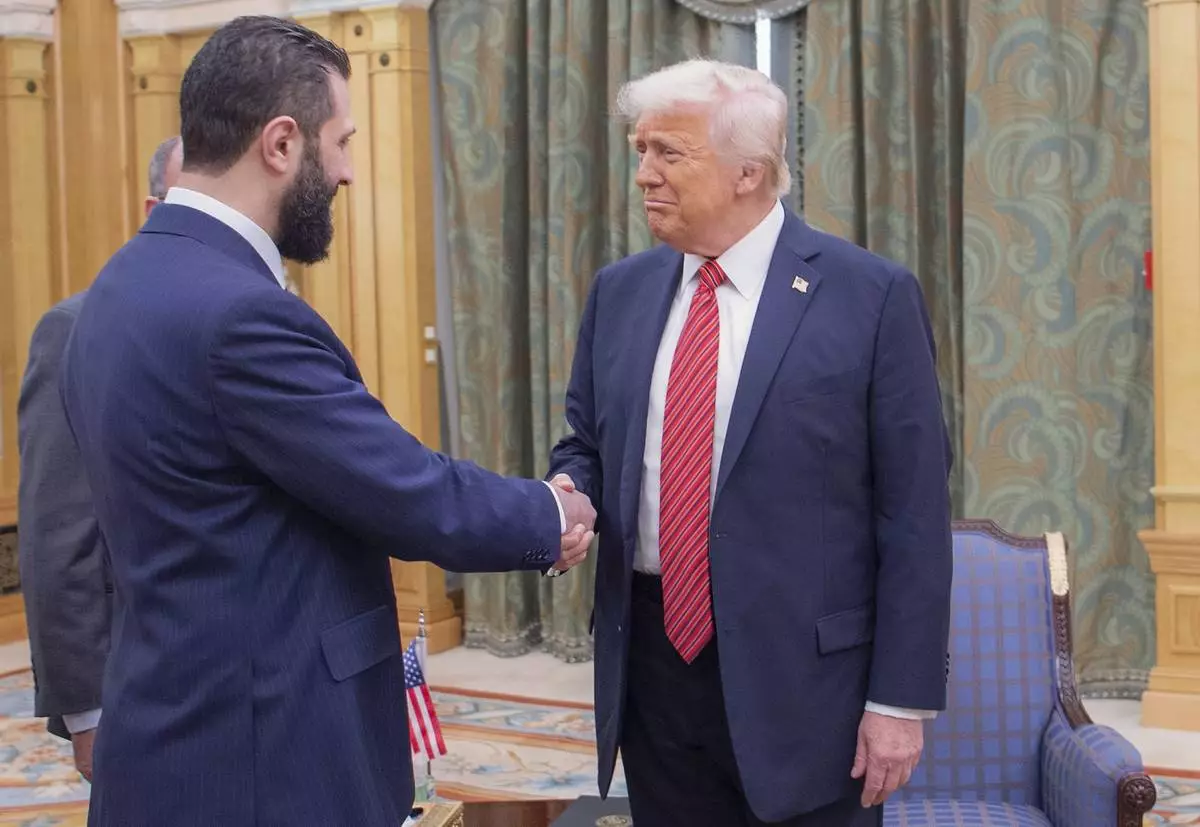
In this photo released by the Saudi Royal Palace, President Donald Trump, right, shakes hands with Syria's interim President Ahmad al-Sharaa, in Riyadh, Saudi Arabia, Wednesday, May 14, 2025. (Bandar Aljaloud/Saudi Royal Palace via AP)

Syrians wave Saudi and Syrian flags in celebration after U.S. President Donald Trump announced plans during his visit to Saudi Arabia to ease sanctions on Syria and normalize relations with its new government, in Homs, Syria, late Tuesday, May 13, 2025.(AP Photo/Omar Albam)

Syrians celebrate after U.S. President Donald Trump announced plans during his visit to Saudi Arabia to ease sanctions on Syria and normalize relations with its new government, in Homs, Syria, late Tuesday, May 13, 2025.(AP Photo/Omar Albam)
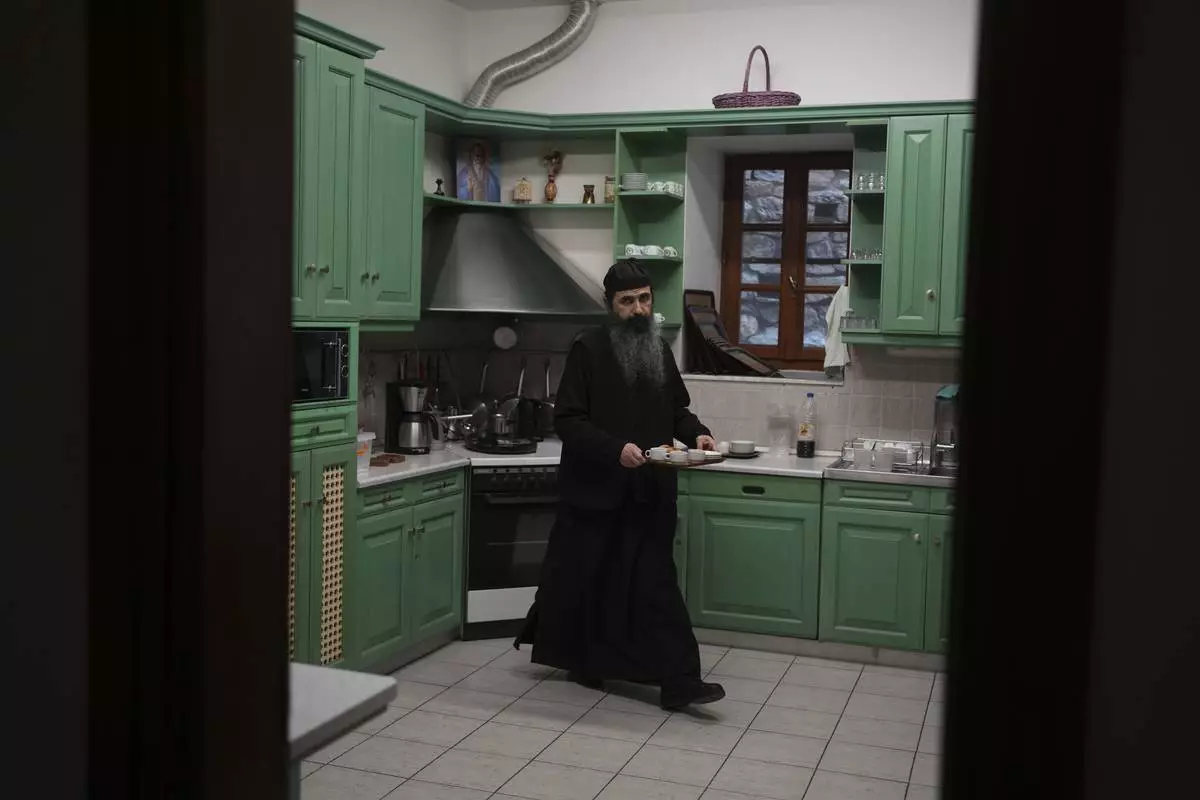
Father Serafeim, a Lebanese-Syrian, prepares coffee in the kitchen of Simonopetra, or the Simonos Petra Monastery, home of the all-male autonomous community Agion Oros, or Holy Mountain, on the peninsula of Mount Athos in northern Greece, Monday, April 14, 2025. (AP Photo/Thanassis Stavrakis)

Syrians celebrate in Umayyad Square after U.S. President Donald Trump announced plans to ease sanctions on Syria and move toward normalizing relations with its new government to give the country 'a chance at peace,' in Damascus, Syria, Tuesday, May 13, 2025. (AP Photo/Omar Sanadiki)

Syrians celebrate after U.S. President Donald Trump announced plans to ease sanctions on Syria and move toward normalizing relations with its new government to give the country 'a chance at peace,' in Idlib, Syria, Tuesday, May 13, 2025. (AP Photo/Ghaith Alsayed)

A girl holds a Saudi flag in celebration after U.S. President Donald Trump announced plans during his visit to Saudi Arabia to ease sanctions on Syria and normalize relations with its new government, in Homs, Syria, late Tuesday, May 13, 2025.(AP Photo/Omar Albam)

Syrians celebrate after U.S. President Donald Trump announced plans during his visit to Saudi Arabia to ease sanctions on Syria and normalize relations with its new government, in Homs, Syria, late Tuesday, May 13, 2025.(AP Photo/Omar Albam)
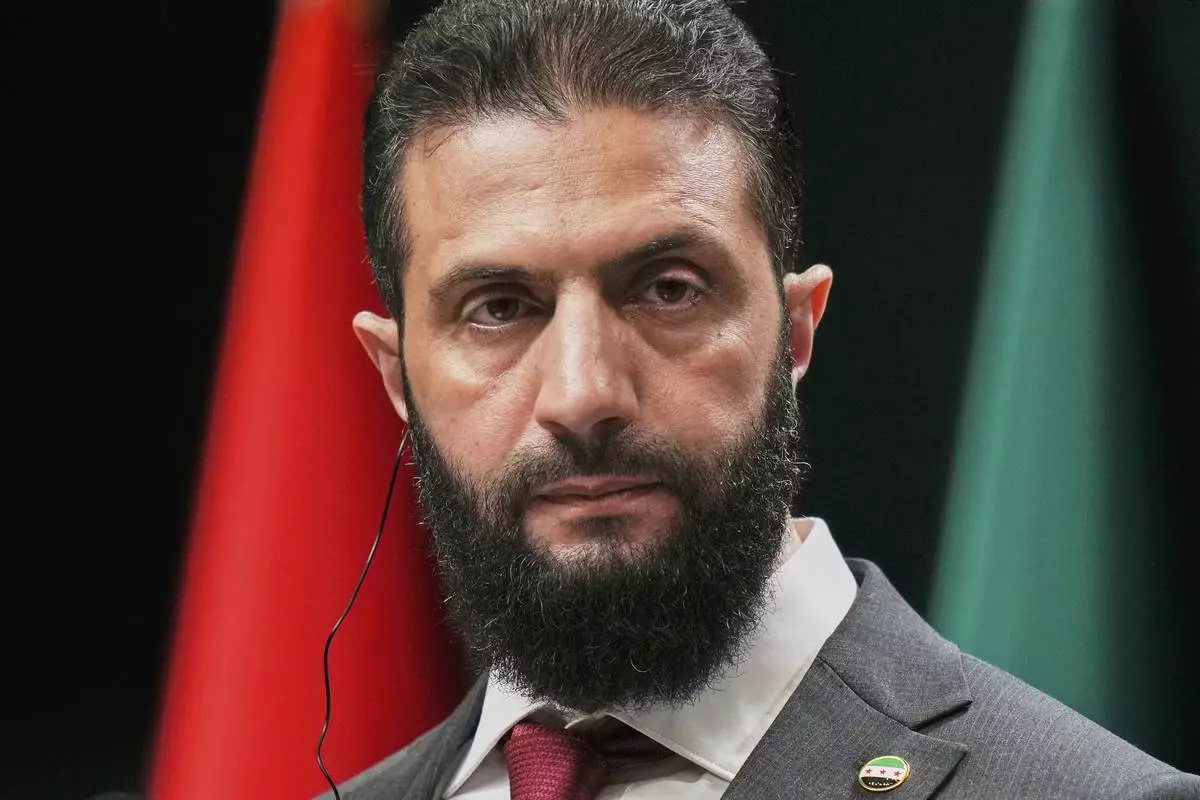
FILE - Syria's interim President Ahmad al-Sharaa, looks on during a joint press conference with Turkish President Recep Tayyip Erdogan at the presidential palace in Ankara, Turkey, Feb. 4, 2025. (AP Photo/Francisco Seco, File)
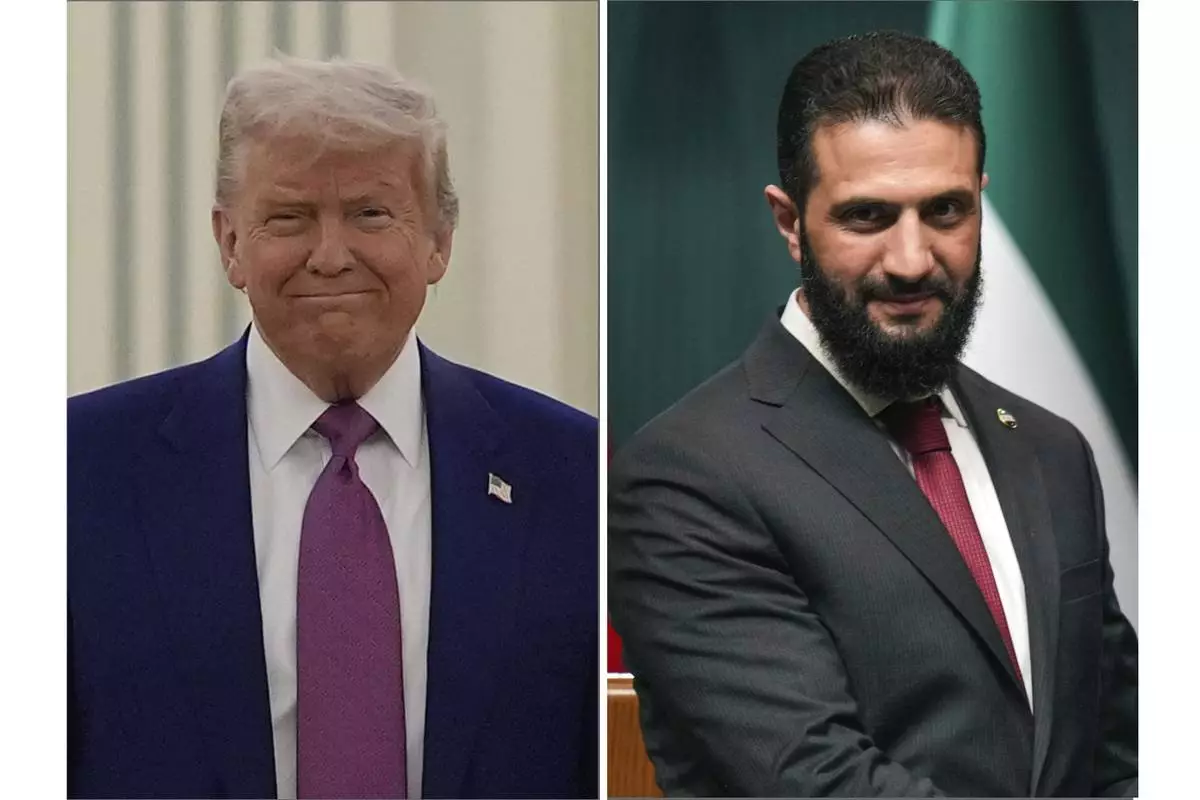
This combination of photos shows U.S. President Donald Trump, left, in Riyadh, Saudi Arabia, on May 13, 2025 and Syria's President Ahmad al-Sharaa in Ankara, Turkey, on Feb. 4, 2025. (AP Photo/Francisco Seco, File) (AP Photo, File)











